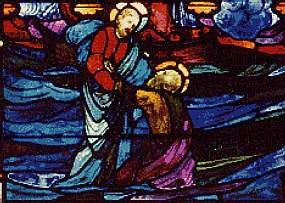 I’ll start by giving credit where credit is due. The pastor of my church preached on the Numbers and Judges passages below, so credit goes to Mark Otten for inspiring part of this post. Yet because this fits so well with the posts to come—and is an issue discussed recently on other blogs—I felt it was a great place to start this mini-series, “When Believers Stumble.”
I’ll start by giving credit where credit is due. The pastor of my church preached on the Numbers and Judges passages below, so credit goes to Mark Otten for inspiring part of this post. Yet because this fits so well with the posts to come—and is an issue discussed recently on other blogs—I felt it was a great place to start this mini-series, “When Believers Stumble.”
We say it’s always about faith, but anymore, I wonder just how much faith we really have. How many people who claim to be Christians are willing to ask themselves the tough question: Do I really have enough faith? You’d be hard pressed to find a die-hard Christian who would admit that they don’t have enough faith to believe for the most impossible situations. I think that our classification of what is “impossible” is slipping, though. Skimming through about a hundred Godblogs shows a remarkable amount of “We believe, but….”
Why is it so hard to take God at His word? If someone says that the Bible isn’t inerrant, most of us will protest vociferously. But press us on which parts we actually believe and the flopsweat forms and the excuses flow.
This isn’t self-righteousness on my part. I struggle with truly believing some parts of the Scriptures. Mentally, I can assent to everything, but when push comes to shove, some parts are almost too good to be true. Now before someone labels me just another wolf in sheep’s clothing, my defense is that I’m in good company.
Take Gideon for example. Some people might call his actions “discernment,” but I read this passage and see a guy with a bagful of “buts.” And before whom is he pulling them out? God Himself:
Now the angel of the LORD came and sat under the terebinth at Ophrah, which belonged to Joash the Abiezrite, while his son Gideon was beating out wheat in the winepress to hide it from the Midianites. And the angel of the LORD appeared to him and said to him, “The LORD is with you, O mighty man of valor.”
And Gideon said to him, “Please, sir, if the LORD is with us, why then has all this happened to us? And where are all his wonderful deeds that our fathers recounted to us, saying, ‘Did not the LORD bring us up from Egypt?’ But now the LORD has forsaken us and given us into the hand of Midian.”
And the LORD turned to him and said, “Go in this might of yours and save Israel from the hand of Midian; do not I send you?”
And he said to him, “Please, Lord, how can I save Israel? Behold, my clan is the weakest in Manasseh, and I am the least in my father’s house.”
And the LORD said to him, “But I will be with you, and you shall strike the Midianites as one man.”
And he said to him, “If now I have found favor in your eyes, then show me a sign that it is you who speaks with me. ”
—Judges 6:11-17 ESV
Things have been so bad for so long, that Gideon can’t let it go. God’s talking to him and he’s so stuck in a rut that it doesn’t seem to matter. He vents like a pent-up volcano. Even when God says He’s going to make it all better through Gideon, the puniest guy in the tribe of Manasseh just won’t drop the disbelief. His eyes tell him all he needs to know. He’s seen the Midianite oppression and no one, not even God, is going to convince him of another truth.
Now the happy ending of the story has Gideon eventually triumphing over the Midianites, but I’ve got to think that God wasn’t entirely happy with his pushback.
It gets worse when all of Israel is called to believe:
At the end of forty days they returned from spying out the land. And they came to Moses and Aaron and to all the congregation of the people of Israel in the wilderness of Paran, at Kadesh. They brought back word to them and to all the congregation, and showed them the fruit of the land. And they told him, “We came to the land to which you sent us. It flows with milk and honey, and this is its fruit. However, the people who dwell in the land are strong, and the cities are fortified and very large. And besides, we saw the descendants of Anak there. The Amalekites dwell in the land of the Negeb. The Hittites, the Jebusites, and the Amorites dwell in the hill country. And the Canaanites dwell by the sea, and along the Jordan.”
But Caleb quieted the people before Moses and said, “Let us go up at once and occupy it, for we are well able to overcome it.”
Then the men who had gone up with him said, “We are not able to go up against the people, for they are stronger than we are.” So they brought to the people of Israel a bad report of the land that they had spied out, saying, “The land, through which we have gone to spy it out, is a land that devours its inhabitants, and all the people that we saw in it are of great height. And there we saw the Nephilim (the sons of Anak, who come from the Nephilim), and we seemed to ourselves like grasshoppers, and so we seemed to them.”
—Numbers 13:25-33 ESV
God came out and said, “I’m giving you a land flowing with milk and honey,” and the response was “We’ll be crushed like gnats by those sons of a Nephilim!” One man here, Caleb, believed God despite what his eyes told him. It didn’t matter how big the giants were; those monsters were the real gnats because Caleb’s God can’t be contained by the whole universe. Caleb’s eyes were focused on a world bigger than the one the rest of the spies saw, his ears attuned to a promise everyone else drowned out with cries of doubt. “Let us go up at once….”—is there a speck of unbelief in that statement? None that I can find.
What is particularly sad about this is what follows in Numbers 14. Read it and ask what happens when God speaks and the people would rather believe their senses than the Author of Truth. We know the wandering that results from this distrust. We know that God let an entire generation of faithless people pass on before the Israelites took possession of that golden land. We can’t believe how crazy they were not to believe, but at the same time, we squirm in our seats.
Lastly, we come to Peter, one of Jesus’ handpicked, the brashest of the bunch:
And in the fourth watch of the night he came to them, walking on the sea. But when the disciples saw him walking on the sea, they were terrified, and said, “It is a ghost!” and they cried out in fear.
But immediately Jesus spoke to them, saying, “Take heart; it is I. Do not be afraid.”
And Peter answered him, “Lord, if it is you, command me to come to you on the water.”
He said, “Come.”
So Peter got out of the boat and walked on the water and came to Jesus. But when he saw the wind, he was afraid, and beginning to sink he cried out, “Lord, save me.”
Jesus immediately reached out his hand and took hold of him, saying to him, “O you of little faith, why did you doubt?”
—Matthew 14:25-31 ESV
Why is this passage in the Scriptures? It wasn’t only for the early Church. What does it say to us in 2006?
The Lord commanded Peter and he came, but looked at the waves.
The Lord commanded the Israelites and they looked at the giants.
The Lord commanded Gideon and he looked at his circumstances.
They all had their senses attuned to the natural world, not the supernatural. They could see past their noses, but not past their preconceptions. They heard God, but relegated Him to a distant second place, choosing instead their fallen, shrill cry of faithlessness.
We are very much like them.
What troubles me is that we don’t have to be. God can do so much more if we believe:
When he entered Capernaum, a centurion came forward to him, appealing to [Jesus], “Lord, my servant is lying paralyzed at home, suffering terribly.”
And he said to him, “I will come and heal him.”
But the centurion replied, “Lord, I am not worthy to have you come under my roof, but only say the word, and my servant will be healed. For I too am a man under authority, with soldiers under me. And I say to one, ‘Go,’ and he goes, and to another, ‘Come,’ and he comes, and to my servant, ‘Do this,’ and he does it.”
When Jesus heard this, he marveled and said to those who followed him, “Truly, I tell you, with no one in Israel have I found such faith. I tell you, many will come from east and west and recline at table with Abraham, Isaac, and Jacob in the kingdom of heaven, while the sons of the kingdom will be thrown into the outer darkness. In that place there will be weeping and gnashing of teeth.” And to the centurion Jesus said, “Go; let it be done for you as you have believed.” And the servant was healed at that very moment.
—Matthew 8:5-10
Jesus, say the word and it will be done. No hesitation on the centurion’s part, none on the Lord’s in answering. And here’s the part that really wows: The centurion’s faith was so strong that Jesus didn’t even have to be in the presence of the centurion’s slave in order to heal.
How easy it is when we believe!
Times are not going to get easier for us Christians, though. There’s no cruise control on this car. Honoring Christ means believing the whole counsel of Scripture, not the parts that are easy to grasp, convenient to believe. Moving beyond our senses is at the core of Christian maturity.
One of the charismata is the gift of faith. You’ll get arguments from theologians as to what exactly that gift entails, but the one thing I know is that we all need to be praying that God would pour it out on us in full measure. We’ll need it in the days to come.


 Ingrid over at
Ingrid over at